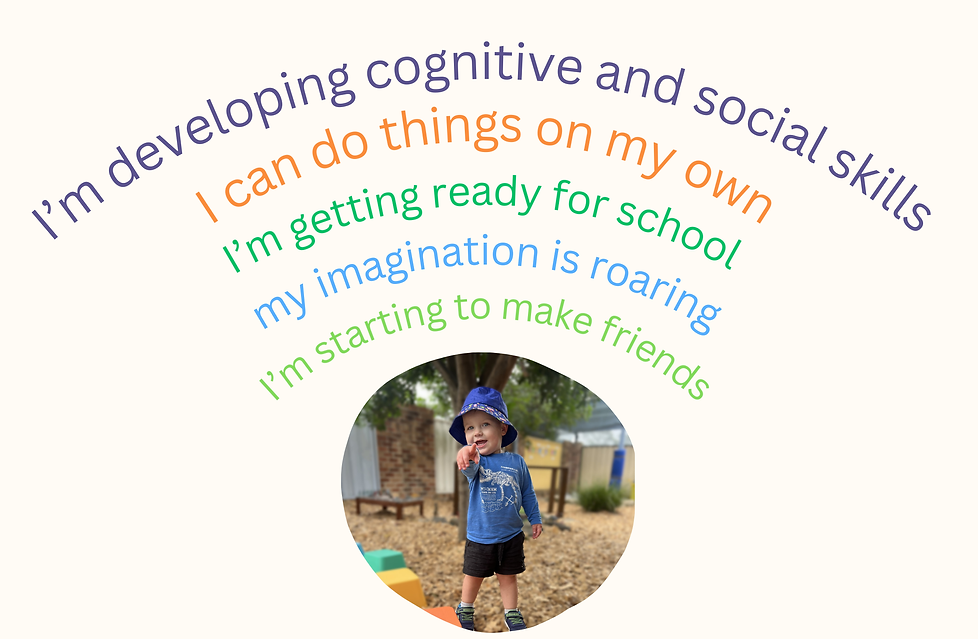
Pre-Schoolers
At KiDZSPOT, ages 4 - 5 is all about accelerated learning as our children are in the final stage of their pre-school development. From Day 1, everything we do is to build their skills for the next stage of life so by about age 4, they’re ready to start the School Readiness Program. Remember that age is a guide only. Every child learns in their own way and at their own pace so while some children will be ready by age 4, others may not.
What to expect from me when I'm 4 and 5
I'm getting ready for kindergarten!
I'm totally coordinated;
I can even get dressed on my own.
I've developed basic literacy and numeracy skills.
My attention span is much longer now.
I can recognise and name colours, numbers and objects
I've started to experience new feelings and I can better express my emotions.
I've started to count,
and I can recognise things that are the same and things that are different.
I can also understand the concept of time.
I like being around people and I'm starting to make friendships.
My vocabulary is growing and I can hold a conversation.
.png)
School Readiness Program
Our School Readiness curriculum is a structured program that has been designed by qualified curriculum developers working in consultation with local schools.
Generally, KiDZSPOT children start the School Readiness Program between the ages of 3 to 4. The program is integrated into daily activities; it is comprehensive, inclusive, dynamic and it exposes young learners to a variety of experiences that are similar to the school environment.
Getting ready for kindergarten is a very big part of any child’s life and we want it to be exciting, smooth and safe. Children need to have a sense of security and healthy expectancy as they get ready to start ‘big school’. Our School Readiness Program helps children master academic skills for the new educational setting whilst ensuring they are also emotionally and socially ready for the great milestone that is school.
Academics
-
Skill development in literacy and numeracy
-
Exposure to diverse subject areas
-
Meet Stage One Outcomes from the Early Years Learning Framework (EYLF)
-
Mapped to the primary school curriculum by working with local primary school curriculum coordinators
Soft Skills
-
The ability to be independent and self-sufficient with age appropriate tasks
-
The development of emotional awareness, emotional intelligence and empathy
-
The ability to make friends, understand social cues and act appropriately in social settings
-
A sense of responsibility and accountability
-
A love of learning
"True learning – learning that is permanent and useful, that leads to intelligent action and further learning — can arise only out of the experience, interest, and concerns of the learner."
John Holt


Developmental Stages for ages 3 - 5
Key Milestones
There will be plenty of physical movement as the pre-schooler loves moving for the sake of moving. By now, they’re very capable walkers and can walk up and down stairs, and play around by throwing, catching and kicking balls. They will also be keen runners, jumpers, cyclists and climbers. Their gross motor skills will have developed significantly and they can coordinate their bodies to be able to cut, hold, throw, jump, tumble and even walk backwards.
The pre-schooler will be able to write their first name and some letters, and might even be able to draw a circle and make detailed drawings of people with body parts and clothes.
Pre-school activities focus on learning basic literacy and numeracy skills, structured and unstructured play that supports the development of interpersonal, communication, and cognitive skills. Pre-school is fundamental is helping build a child’s confidence, make friends, develop responsibility and independence. It is a key stepping stone to the next stage of a child’s life so it is crucial that, during these years, a child is nurtured in the best possible way.
Emotional Development
The pre-school years are super exciting because there is a lot going on. Emotional development has boomed and new emotional expressions will form as the child is better able to articulate their thoughts and feelings. Pre-schoolers like to be around people and you will notice new friendships forms – including some very real imaginary friends.
The pre-schooler is also more likely to have better control over their emotions, there will be fewer temper tantrums and a lot more cooperation. They can still be demanding but they will also be more helpful.
Imagination Boost
A pre-schooler's imagination will be roaring and activities like make-believe play will be a favourite. By now, the pre-schooler will understand concepts such as opposites; they will know left and right, as well as the names of letters and numbers and be able to count to 10.
Their language skills will have sky-rocketed and they will love story telling and having conversations. This is the start of the incestuous questioning as their young mind wants to know and understand everything. By five years of age, a child will be able to speak clearly and form much more complex sentences.
Pre-schoolers won’t have problems dressing themselves, putting their shoes on (they may struggle with shoelaces though) and can most likely use a fork, spoon and maybe even a butter knife. They will also be able to go to the toilet and brush their teeth on their own.

.png)